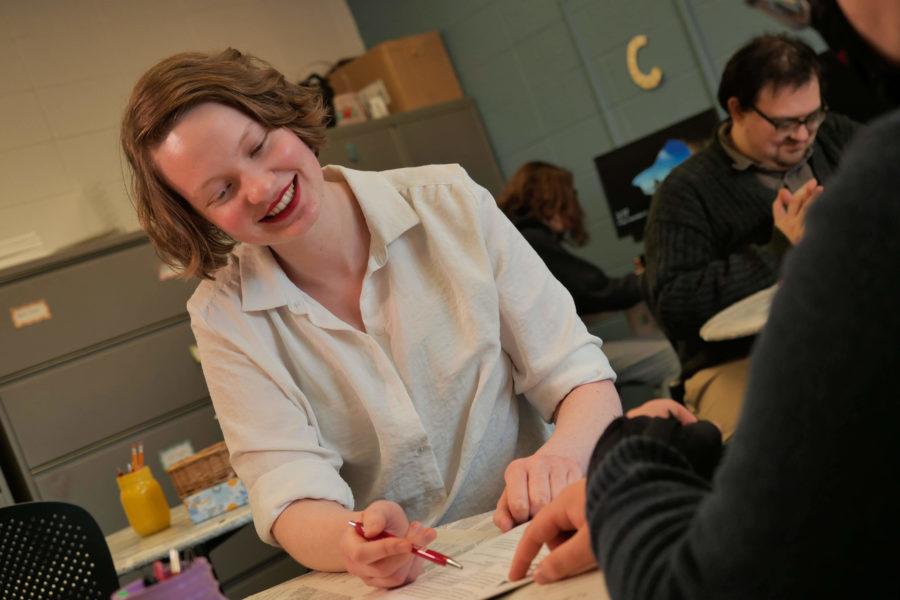
Written by: Emily R.
I still remember my first encounter with the University Writing Center: I was a high school student on a campus visit, attending a panel on IUPUI’s academic resources. One of the panelists worked at the UWC, and as I listened to her describe her job I knew I wanted to become a writing consultant, too. My only concern? I didn’t plan to major in English, and I wasn’t sure if that disqualified me.
After the panel I approached the older, wiser student and asked her my pressing question: “Can I work at the Writing Center if I’m not an English major?” I was thrilled when she said yes, telling me that prospective consultants only had to take a class called Writing Center Theory and Practice, which trains you to become an effective consultant.
Since that day, I’ve been admitted to the Kelley School of Business, (nearly) completed a B.S. in marketing and international studies, and worked at the UWC for three semesters. During that time, my work as a writing center consultant has enhanced my course of study—and vice versa. And I’m not alone; I have coworkers who study everything from biology to religious studies.
If you’re pursuing a major outside of the English department, here are five reasons (identified by non-English-major consultants) why you should consider working at the Writing Center:
1. You can work on secondary projects directly related to your major—then add them to your résumé.
When I’m not consulting with writers, I spend my downtime putting my marketing skills to use: I write posts for our social media pages and I’m developing a survey tool that will collect data on students’ perceptions of the UWC (marketing research!).
Katie, a psychology major with an art minor and pre-art therapy certificate, also draws from her academic experience: “My course of study as an art student has led me to implement therapeutic art into the UWC’s daily programming by designing and leading workshops that emphasize the connection between art, mindfulness, and writing.”
2. You can develop your communication skills.
Michael, a graduate student in the philosophy program, points out that the productive conversations we have in the Writing Center are beneficial not only for his field, but also for life in general. “The values of dialogue and discussion are conducive to what I do: ask questions, build consensus, and investigate trains of thought,” he said. “I’ve had the opportunity to hone my writing and general communication skills and focus a lot on honest reflection.”
3. You can (sometimes) provide course-specific insights to students in your major.
All consultants have the same training, and we’re all qualified to work with any kind of writing. But as a business student, I can instantly relate to stressed I-Core students, fluently speak business jargon, and share specific insights for classes I’ve taken. It’s so fulfilling to use the knowledge and experience I’ve gained in class to support my fellow Kelleys in their writing assignments.
4. You can apply and strengthen skills you’ve learned in your field of study.
Consultant and 1L JD student Tori uses her law school skills when working with students in the polishing and editing stage. “Law school is all about the details,” she said. “I often use those attention to detail skills that I learned in law school when working with clients who are in those last stages of the process and really want to get down to the nitty gritty.”
5. You can be part of an exciting, interdisciplinary work environment.
At the UWC, we work with students of all majors on projects ranging from lab reports to poetry collections. One of the best parts of the job is learning from writers and coworkers who represent a variety of majors. And Ijada, a consultant majoring in tourism, conventions, and event management, points out that employing students from diverse disciplines helps us create this collaborative environment: “It allows us to have a bigger reach and connect with more members of the student body.”
Regardless of your major, if you want a flexible, fulfilling on-campus job, ENG-W397: Writing Center Theory and Practice is now enrolling for the Fall 2020 semester. The three-credit-hour class will meet on Tuesdays and Thursdays from 1:30 to 2:45pm and is open to all students with no prerequisites. You can contact our director Marilee Brooks-Gillies at mbrooksg@iu.edu for more information.

